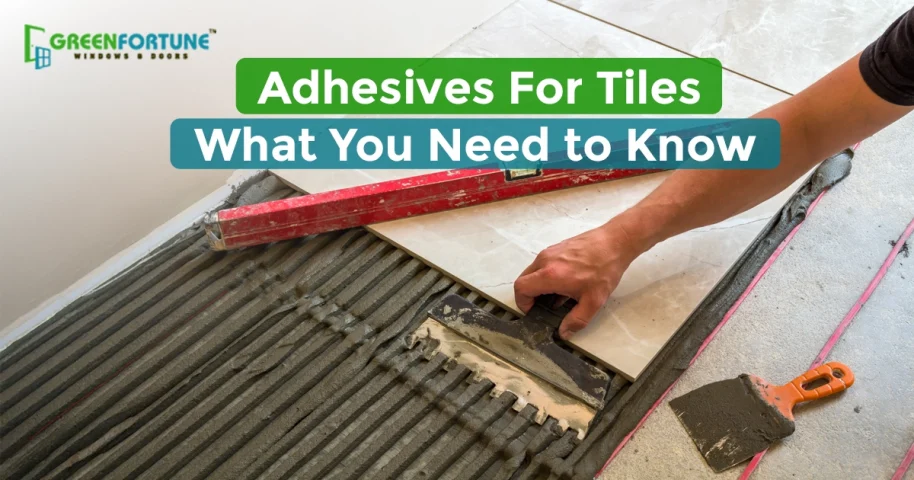
How Stormproof Windows Can Save Your Home During Extreme Weather
February 18, 2025
Eco Friendly House Building: What It Is & How to Make Your Home Greener
February 19, 2025Tiling your floors and walls has become a lot easier with the right adhesives for tiles. Not only do tile adhesives set your tiles in place, but they also see that they last longer. Plus, the right tile adhesives can add a professional finish to your work, keeping your home looking fresh for years to come.
Adhesive for tiles acts as a bonding agent between the tile and the surface. This makes sure that your wall or floor tiles stay in place, free from cracking or shifting. Unlike traditional tile cement, adhesives simplify the whole tiling process, cutting down on time and effort.
Thanks to modern techniques, tile adhesives have become more flexible. But, with so many types of tile adhesives, which one should you choose? Let’s look into the types of adhesive for tiles, their advantages, disadvantages, and more.
Why Are Adhesives For Tiles Important?
Tile adhesives are basically the “glue” that holds your tiles in place. Adhesive glue for tiles ensures that your tiles stay crack-free and last longer. Using adhesive glue can also save you time and effort.
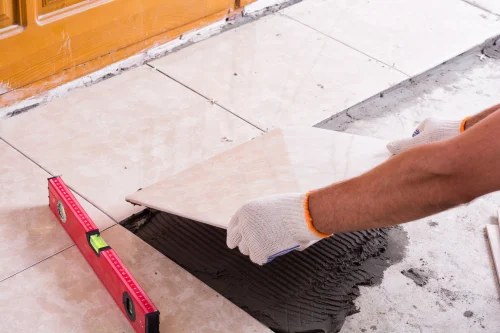
Here are some other ways tile adhesives are important:
- Strong bonding: Adhesives for tiles secure the bond between the tile and the surface, preventing the tiles from cracking and shifting over time.
- Time-saving: Compared to traditional tile cement, tile adhesives are time-saving and make the process simple, reducing extra cost and effort.
- Durability: Adhesive glue for tiles can withstand temperature changes, moisture, and even everyday wear and tear. This makes your tiles last longer than most.
- Easy to use: Adhesive tile glue is also easy to use for DIY projects. No need for mixing cement for tiles anymore. Tile adhesives are smooth and easy to apply, saving you installation costs and time.
- Waterproof: Tile adhesives also come with waterproof properties, making them good for spaces such as bathrooms and kitchen tiles. Moreover, this helps reduce the risk of mould growth and prevents water damage to the tiles.
Types of Tile Adhesives
There are different types of tile adhesives to choose from based on your types of tiles and their use.
1. Cement-based Tile Adhesive
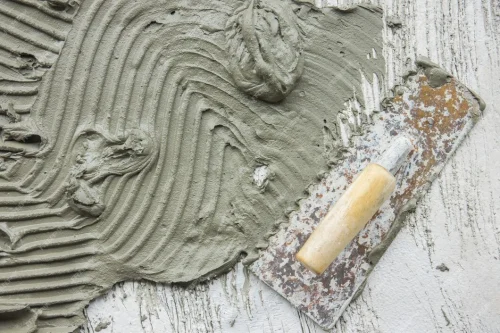
Cement-based tile adhesives are readily and commonly available on the market. They come in powder and premixed forms. When cement adhesives are mixed with water, it becomes a paste that sticks well to most surfaces.
Pros:
- They are easy to apply and are suitable for different types of tiles.
- Good for areas such as bathroom and kitchen.
Cons:
- Takes more time to work with.
- Need to be applied immediately after mixing.
2. Polymer-Modified Tile Adhesive
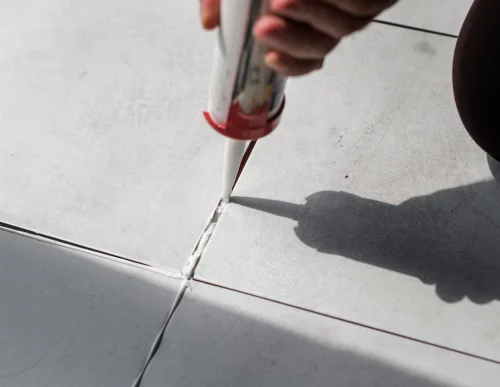
Another type of tile adhesive is polymer-modified adhesive. This adhesive for tiles includes polymer additives to improve bonding strength. This adhesive is ideal for areas expecting high foot traffic and surfaces that are more likely to expand or contract.
Pros:
- Better tile bonding strength.
- Works well with plywood or old tiles.
- Good for both indoor and outdoor installation.
Cons:
- Rather expensive than other cement-based adhesives.
- Needs careful mixing to get a smooth consistency.
3. Ready-Mix Tile Adhesives
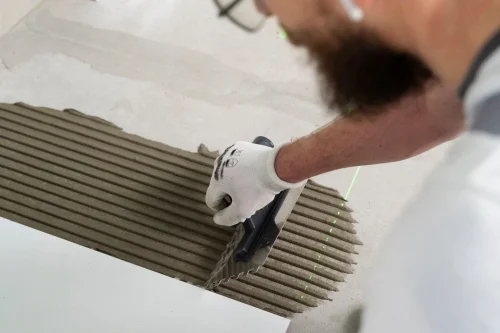
Ready-mix adhesive for tiles is exactly what they say on the pack. They come in pre-mixed and are good for quick work. This floor and wall tile adhesive is good for small areas that need quick fixing.
Pros:
- Easy to use as they are pre-mixed and ready to apply.
- Ideal for DIY work and small installations.
- They are mess-free.
Cons:
- Slightly more expensive.
- Lacks tile bonding strength for heavier tiles and larger tile installations.
4. Epoxy-Based Tile Adhesives
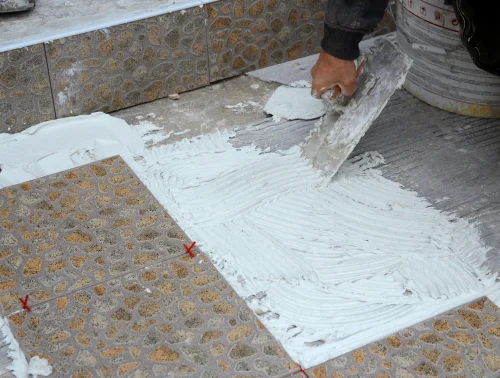
Other adhesives for tiles include epoxy-based adhesives. This adhesive glue for tiles is durable and has strong tile bonding properties. You can use epoxy adhesives for installations where there is more foot traffic or for commercial spaces. This adhesive can also be ideal for wet areas such as swimming pools and bathrooms, as it also has waterproof properties.
Pros:
- Strong tile bonding and durability.
- Water-resistant and chemical-resistant.
- Ideal for heavy tiles and high foot traffic areas.
Cons:
- Harder to work with as it needs proper application.
- Expensive compared to other adhesives glue for tiles.
5. Special Tile Adhesives
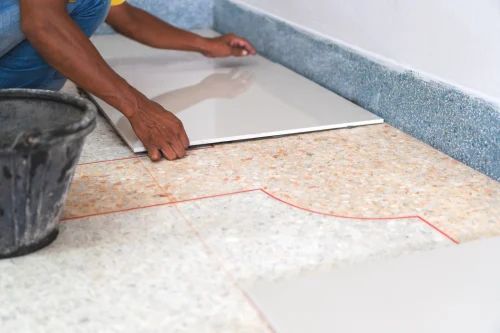
As the name suggests, special tile adhesives are best used for special tile installations. This adhesive glue for tiles can come in handy when working with heavy tiles like natural stones, glass tiles, or metal tiles. This adhesive for tiles is good for tiling, where traditional tile cements may not be strong enough.
Pros:
- Have strong tile bonding properties.
- Works well for tiles such as glass, metal, or non-porous substrates.
- Are durable, especially when it comes to demanding tile installations.
Cons:
- Are expensive for standard tiling installations.
- Need professional expertise to apply.
Also Read: The difference between “ceramic vs vitrified tiles”? Which one should you choose for your home?
Advantages of Tiles Adhesives
Tile adhesives can have their advantages and disadvantages. So let’s start by looking at some of the advantages of tile adhesives:
1. Strong Tile Bonding
Adhesives for tiles have better bonding strength, making your tiles stay securely attached to the surface. This can prevent any shifting and cracking over time on your tiles.
2. Better for Modern Tiles
If you have porcelain or vitrified tiles on your walls or floors, then tile adhesives can be a good option. These tiles have denser surfaces and need stronger glue, making tile adhesives an ideal choice.
3. Water-Resistant
Some adhesive glues for tiles have water-resistant properties, making them ideal for areas such as bathrooms, kitchens, and outdoor areas such as swimming pools.
4. Quick and Easy to Install
Tile adhesives are quick to dry, reducing the time for tile installation. These tile flooring adhesives can also be good for DIY and smaller installation projects.
5. Better Compatibility
Adhesives for tiles work on almost every substrate including concrete, plywood, glass, metal, plaster, and drywall. This makes tile floor glue good to use for different installation needs.
6. Aesthetically Pleasing
Tile flooring adhesive ensures tile alignment, giving your wall and floor tiles a smooth and visually appealing finish.
Disadvantages of Tiles Adhesives
Some disadvantages of using tile adhesive for wall and floor include:
1. Expensive
Certain adhesives for tiles can be expensive, such as epoxy and polymer-modified ones. In comparison, cement adhesives are cheaper.
2. Longer Drying Time
Certain adhesive types can take longer to dry, delaying your tile installation process. Even so, adhesives for tiles might not always be ideal for DIY and small tiling projects as they need careful application.
How to Select Adhesives For Tiles?
Choosing adhesive glue for tiles might not always be easy, so here are some tips to help you pick the right adhesive tile glue:
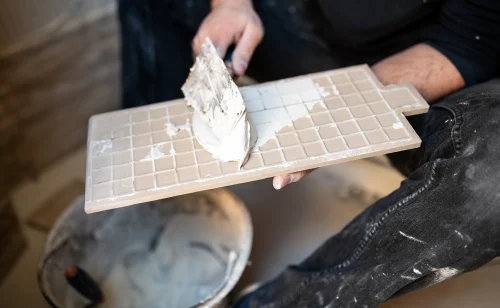
- Consider types of tiles: Some tiles such as porcelain and natural stone may need stronger adhesives, so try to consider the tiles and your needs before buying any adhesive glue.
- Consider application surface: Before you purchase a tile flooring glue, consider the surface you want to apply it on. Different adhesive glues for tiles suit different tile surfaces.
- Consider the location: Are you applying the tile adhesives on outdoor or indoor tiles? Places with high moisture need water-resistant tile adhesives, so try to consider that before you buy an adhesive for tiles.
- Consider your budget: Certain tile glues like cement adhesives are a lot cheaper and easily available, while others like epoxy and polymer adhesives are expensive. Before buying, look at the budget and weigh the pros and cons.
Related Read: Top Wall Tile Design for Homes to Elevate Your Interiors
Final Words:
The adhesive you choose affects both the tile installation and the final look. So, before buying a tile adhesive, consider what you need, ease of application, and durability. After all, there are various types to choose from! I hope this guide helps you select the best adhesives for tiles for your walls and floors.
About Green Fortune:
Green Fortune brings you the highest-quality uPVC products for your home that aren’t just stylish, but pocket-friendly, too! With a wide range of designs to pick from, our products complement your home needs with a promise of durability and sophistication. Moreover, Green Fortune products are ISO-certified and come with an extended warranty period.
So, if you’re thinking of redesigning your home with elegance, quality, and value, then Green Fortune (and our products!) have you covered.
To learn more about our products, click here.
Frequently Asked Questions (FAQs)
1. Can you use tile adhesive to install tiles over existing tiles?
Yes, you can use tile adhesives to install tiles over existing ones. For this, you can use polymer-modified or epoxy-based tile adhesives as they have better bonding strength and last longer.
2. What is type 2 tile adhesive?
Type 2 tile adhesives are cement-based adhesive glue for tiles and can be used for tiles with low porosity. This glue for tiles can be used for areas such as bathroom stalls and swimming pools, both outdoor and indoor.
3. Is tile adhesive better than cement?
Because of their flexibility and tile bonding strength, tile adhesives are better than cement adhesives. Tile adhesives are also waterproof and prevent cracking compared to traditional mortar-based glue.

